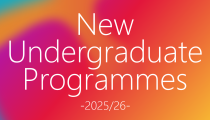Sept 2025 Entry
1 year (Full-time)
2 years (Part-time)
31
The selection process will begin on 13 January 2025, with offers being made in rounds on a rolling basis. We strongly encourage applicants to submit their applications as early as possible to ensure the best chance of being considered for admission.
Qualified candidates will be notified of their results via the eAdmission System. Once all vacancies are filled, the remaining qualified applicants will be put on a waiting list.
Interviews may be required.
What's New
Programme Aims
This is a Master’s level programme for graduates with a psychology major who are looking for systematic training in the latest advances in assessment and practice methods used in various professional psychology settings.
The programme aims to provide a well-balanced foundation in assessment, intervention, research and evaluation. Over 1 or 2 years, a solid identity as an applied psychologist with functional competencies in these areas will be established.
Characteristics
The teaching faculty members of the Department of Applied Social Sciences have a long history of being active in multi-year and territory-wide research and consultancy projects that reflect the policy priorities of Hong Kong and the Chinese mainland. This background has resulted in the development of a unique curriculum that includes direct and innovative instructional strategies, and in some cases first-hand exposure to the large-scale implementation of experimental programmes in education, health and social care.
The requirements for becoming a registered psychologist in Hong Kong are (1) be a member of the Hong Kong Psychological Society (HKPS), (2) possess a Master’s degree in psychology, and (3) have a minimum of 1 year of post-master’s relevant working experience. This programme is designed to help students meet the second requirement.
On successful completion of the programme, students with membership in HKPS may consider applying for registration after obtaining at least 1 year of post-qualification experience in a discipline of psychology deemed acceptable by the HKPS. The final decision on registration is made by the HKPS. All psychologists on the register must observe the Code of Professional Conduct maintained by the HKPS.
The programme is composed of Foundational Competencies and Functional Competencies. Core and Elective Subjects are grouped under three major study areas.
Foundational Competencies
Core Subject
- Foundational Competencies (6-credit course includes practice-based or research-based attachment)
Functional Competencies
Psychological assessment, research and evaluation competencies: Advanced Psychological Assessment (APA)
Core Subjects
- Psychometric Theory & Scale Construction
- Use & Dissemination of Psychological Instrumentation in Research & Service Context
- Advanced Research Methods: Mixed Methods in Research
Elective Subjects
- Psycho-socio-educational Programme Development & Evaluation
Psychological intervention competencies: Advanced Practice Methods (APM)
Elective Subjects
- Cognitive Behavioural Intervention
- Expressive Psychotherapy
- Nurturing the Gifted & Talented: Instructional Models & Professional Practices
- Parenting & Parent Development
- Career Counselling: Theories & Practice
- Workplace Counselling
- Attentional Control & Social Adaptation
Knowledge and enterprising competencies
Core Subject
- Cognitive Neuroscience Methods in Applied Settings
Elective Subject
- Psychology of Exceptional Children
Remarks:
- In addition to the above subjects, students are required to complete a 1-credit subject on Academic Integrity and Ethics (AIE). No tuition fee is required for this subject.
- Programme structure and content are subject to continual review and changes.
31
Dr Herrick Wong
DEd (The Chinese University of Hong Kong)
MPhil (The Hong Kong Polytechnic University)
BSc (University of Alberta)
-
A recognised Bachelor’s degree with a major in Psychology.
If you are not a native speaker of English, and your Bachelor's degree or equivalent qualification is awarded by institutions where the medium of instruction is not English, you are expected to fulfil the University’s minimum English language requirement for admission purpose. Please refer to the "Admission Requirements" section for details.
For further information on admission matters, please contact:
Tel: (852) 2766 4315
Email: sspg@polyu.edu.hk
3 for local students
6 for non-local students
HK$243,900 per programme (Taught subject: HK$7,600 per credit; Foundational Competencies: HK$10,250 per credit) for local and non-local students
* No tuition fee is required for the 1-credit Academic Integrity and Ethics subject
Entry Scholarships are available. Please click here for details.
PolyU reserves the right to change or withdraw the scholarship at any time. In case of any dispute/disagreement, PolyU's decision is final.
Copies of the graduation certificate and official academic transcript are required. Please also provide the academic transcript explanatory notes of the grading systems (課程績點與等級換算關係表).















